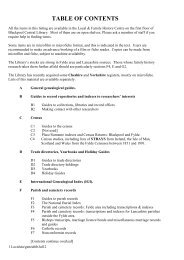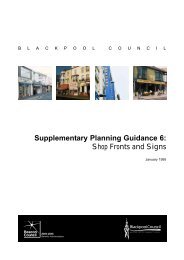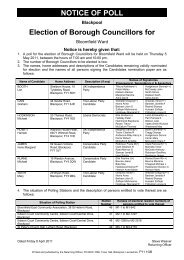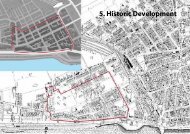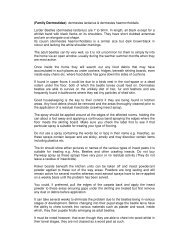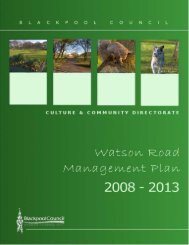Mental capacity policy [PDF 126KB] - Blackpool Borough Council
Mental capacity policy [PDF 126KB] - Blackpool Borough Council
Mental capacity policy [PDF 126KB] - Blackpool Borough Council
You also want an ePaper? Increase the reach of your titles
YUMPU automatically turns print PDFs into web optimized ePapers that Google loves.
SECTION 2<br />
CONSIDERATION OF DATA & RESEARCH<br />
List all examples of quantitative and qualitative data available that will enable the impact assessment to<br />
be undertaken<br />
Include information where appropriate from other directorates, Census 2001 etc.<br />
<strong>Blackpool</strong> Figures, Office of National Statistics (Census Information), National Statistics reports (Department of<br />
Work and Pensions)<br />
Population<br />
<strong>Blackpool</strong> has a total population of 142,283, 48% men and 52% women (similar to national gender balance).<br />
Marital Status<br />
In total 42% of <strong>Blackpool</strong>’s adult population is single, 29% is within their first marriage, and a further 29% is<br />
remarried, separated, divorced or widowed. In contrast the North West figures are 45%, 34% and 21%, and<br />
England’s figures are 44%, 35% and 21%<br />
Children/Caring Responsibilities<br />
The percentage of households with dependent children is lower in <strong>Blackpool</strong> (26.1%) than regionally (30.5%) and<br />
nationally (29.5%).<br />
Ethnicity/Religion<br />
<strong>Blackpool</strong> has a very low number/percentage of people from BME communities with 98.4% classifying<br />
themselves as white. The percentages are lower in the North West (94.4%) and in England (90.9%).<br />
Sexuality % f % %<br />
The percentage of people indicating they live in a same sex relationship is higher in <strong>Blackpool</strong> at 0.5% than in the<br />
North West or England (0.2%).<br />
Age<br />
<strong>Blackpool</strong> has an older population than in the North West and in England as a whole<br />
- 20% of the population is over 65 in <strong>Blackpool</strong>, as oppose to 16% in England and North West.- 16% of the<br />
population in <strong>Blackpool</strong> aged 16-74 are classed as economically inactive/retired, as oppose to 14% regionally and<br />
nationally.<br />
- There are more retired women than men.<br />
Health<br />
<strong>Blackpool</strong> has more people in poorer health than regionally and countrywide<br />
- 14% of <strong>Blackpool</strong> population indicate they are not in good health, this is higher than in North West (11%) and<br />
within England (9%)<br />
- 25% believe they have a limiting long term illness in <strong>Blackpool</strong>, this is higher than in North West (21%) and<br />
within England (18%).<br />
- 10% of people between 16-74 are permanently sick or disabled and economically inactive. Percentages are 8%<br />
for the NW and 5 for England. In <strong>Blackpool</strong> approximately a third more men than women are in this category.<br />
- 42.9% of households in <strong>Blackpool</strong> include one or more person with a limiting long-term illness, statistics in the<br />
North West are 38.4% and in England 33.6%.<br />
In<strong>capacity</strong> Benefit/Severe Disablement Allowance (from Feb 2006 figures)<br />
In <strong>Blackpool</strong> 10,530 people receive in<strong>capacity</strong> benefit and 990 people receive or severe disablement allowance<br />
making a total of 11,520. This is a higher proportion of the population than regionally or nationally.<br />
There has been a reduction in the number of people claiming In<strong>capacity</strong> Benefit, between Feb 2005 and Feb<br />
2006 (by -2.6%), which appears to follow a national downward trend. However between Aug 2001 and Feb 2006<br />
there has been an increase of +2.6% in <strong>Blackpool</strong> IB claims, which is in line with the national increase of +2.7%,<br />
but not with the regional reduction of -4.1% over the same period.<br />
There has been a sharper reduction in the numbers claiming Severe Disablement Allowance. Between August<br />
2001 and February 2006 there has been a -19.5% reduction in the number of claimants for SDA in <strong>Blackpool</strong>, and<br />
a steeper decline of -22.7% and -23.5 regionally and nationally over the same period.<br />
5% of claimants are under 25, 49% between 25 and 49, 33% between 55-59 and 13% over 60.<br />
62% of people claiming these benefits are male (58% in NW, England)<br />
76% of people have been claiming for more than 2 years<br />
The majority of people claiming these benefits are for are mental disorders (41%), followed by musculoskeletal<br />
injuries/conditions(18%).


![Mental capacity policy [PDF 126KB] - Blackpool Borough Council](https://img.yumpu.com/21999914/6/500x640/mental-capacity-policy-pdf-126kb-blackpool-borough-council.jpg)
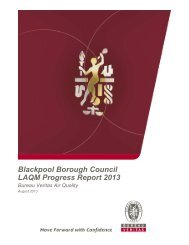
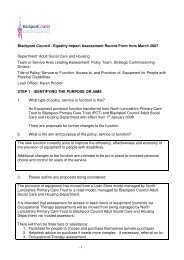
![Control of contractors arrangements [PDF 45KB] - Blackpool ...](https://img.yumpu.com/21999918/1/184x260/control-of-contractors-arrangements-pdf-45kb-blackpool-.jpg?quality=85)
![Day service [PDF 137KB] - Blackpool Borough Council](https://img.yumpu.com/21999915/1/184x260/day-service-pdf-137kb-blackpool-borough-council.jpg?quality=85)
